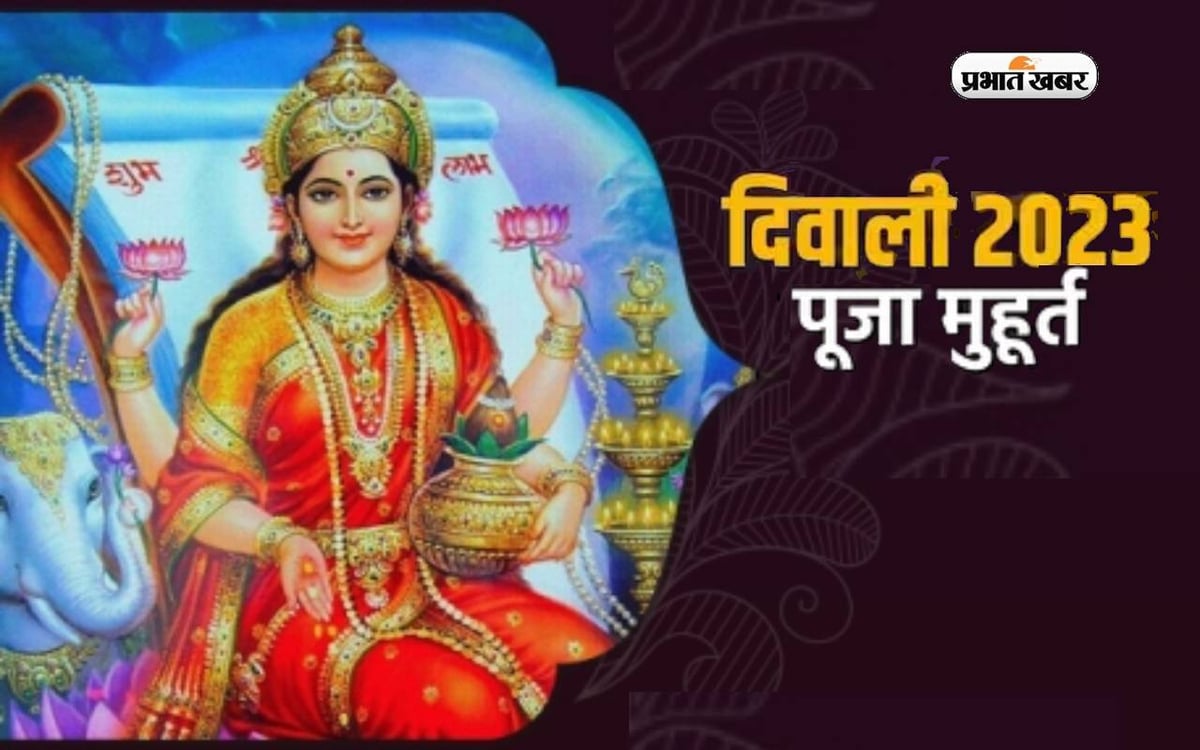Diwali 2023 Shubh Muhurat: According to the Vedic calendar, this year the festival of Diwali will be celebrated on 12 October 2023. On this day, there is a ritual to worship Mahalakshmi and Kuber, the god of wealth. On the day of Diwali, one should wake up early in the morning and worship ancestors and family deities with their family and seek their blessings. Since this day is Amavasya, it is also considered the best day to perform Shraddha for the ancestors. The day of Diwali is considered especially fruitful for the worship of Goddess Mahalaxmi. On this day, Shri Mahaganesh ji, Mata Mahalakshmi ji, Mata Mahasaraswati ji and Mata Mahakali ji are worshipped.
When is Diwali 2023?
In Sanatan Dharma, festivals and festivals are celebrated on the basis of Udaya Tithi, but it is auspicious to perform Lakshmi Puja during Pradosh Kaal on the day of Diwali. The time of worship of Pradosh Kaal is falling on 12th November, hence this year Diwali will be celebrated on 12th November 2023.
Diwali 2023 puja auspicious time
-
Amavasya date starts – 12th November from 2:44 pm
-
Amavasya date ending – 13 November 2023 at 2:56 pm
-
Diwali 2023 date- November 12, 2023
-
Diwali 2023 Lakshmi-Ganesh Puja Muhurat – On November 12, from 5:40 pm to 7:36 pm
-
Mahanishith Kaal Muhurta- Late night on 12th November from 11:49 pm to 12:31 pm
diwali puja material
Wooden chowki, red or yellow cloth to cover the chowki, idols of Goddess Lakshmi and Lord Ganesha, kumkum, sandalwood, turmeric, roli, akshat, betel nuts and betel nuts, whole coconut with its husk, incense sticks, ghee for lamp , brass lamp or earthen lamp, cotton wick, Panchamrit, Ganga water, flowers, fruits, Kalash, water, mango leaves, camphor, Kalava, whole wheat grains, Durva grass, sacred thread, incense, a small broom, Aarti. plate of
Importance of Diwali Puja (Diwali 2021 Laxmi Pujan Significance)
The day of Diwali is considered very auspicious to get the blessings of Goddess Lakshmi. By worshiping Goddess Lakshmi on this day, her blessings always remain on the person. A person never faces shortage of money. According to the scriptures, Goddess Lakshmi comes to roam the earth on this night. There is a belief that on the day of Diwali, Mother Goddess does not leave the houses where she sees cleanliness, lighting and rituals of worship of Gods and Goddesses. By worshiping Goddess Lakshmi, there is never any lack of happiness and prosperity in the house.
What to do on Diwali?
1. On the day of Kartik Amavasya i.e. Diwali, one should take bath in the morning after massaging the body with oil. It is believed that doing this does not cause loss of money.
2. On the day of Diwali, people other than the elderly and children should not eat food. Take food only after worshiping Mahalakshmi in the evening.
3. On Diwali, worship your ancestors and offer incense and food. During Pradosh period, show the path to your ancestors by holding a meteor in your hand. Here, meteor means showing the path to the ancestors in the light of fire by lighting a lamp or through other means. By doing this the souls of the ancestors attain peace and salvation.
4. Before Diwali, at midnight, men and women should sing songs, bhajans and celebrate at home. It is said that by doing this the poverty prevailing in the house goes away.
mythology of diwali
There are many religious beliefs and stories associated with every festival in Hindu religion. There are two important mythological stories prevalent regarding Diwali.
1. On the day of Kartik Amavasya, Lord Shri Ram Chandra ji returned to Ayodhya after spending fourteen years in exile and destroying Lankapati Ravana. On this day, people celebrated the arrival of Lord Shri Ram Chandra ji in Ayodhya by lighting lamps. From then onwards Diwali started.
2. According to another story, a demon named Narakasura had troubled the gods and saints with his demonic powers. This demon had taken captive 16 thousand women of sages and saints. Troubled by the increasing atrocities of Narakasura, the gods and saints appealed to Lord Shri Krishna for help. After this, Lord Shri Krishna killed Narakasura on the Chaturdashi of Krishna Paksha in the month of Kartik and freed the gods and saints from his terror and also freed 16 thousand women from captivity. In this happiness, people lit lamps in their homes on the second day i.e. Amavasya of Kartik month. Since then the festivals of Narak Chaturdashi and Diwali started being celebrated.
Astrological significance of Diwali
Every festival has astrological significance in Hindu religion. It is believed that the direction of planets and special yoga on various festivals are auspicious for the human community. In Hindu society, the time of Diwali is considered very auspicious for starting any work and purchasing any item. There is astrological significance behind this idea. Actually, around Diwali, the Sun and Moon are situated in Swati Nakshatra in Libra. According to Vedic astrology, this position of Sun and Moon is auspicious and gives good results. Libra is a zodiac sign with a balanced attitude. This zodiac sign represents justice and impartiality. Venus is the lord of Libra, which itself is the factor of harmony, brotherhood, mutual harmony and respect. Due to these qualities, the presence of both Sun and Moon in Libra is a pleasant and auspicious combination.
Diwali has special significance both spiritually and socially. In Hindu philosophy, Diwali has been called the celebration of inner light over spiritual darkness, knowledge over ignorance, truth over falsehood and good over evil.

